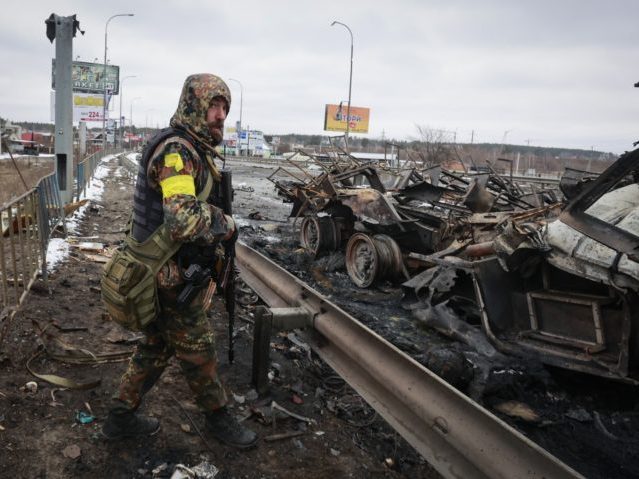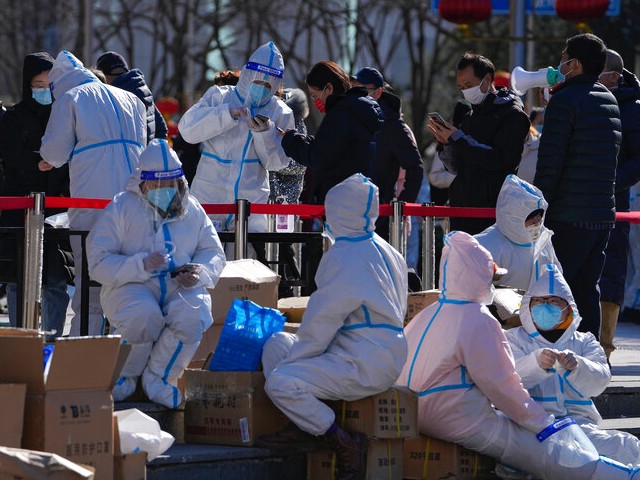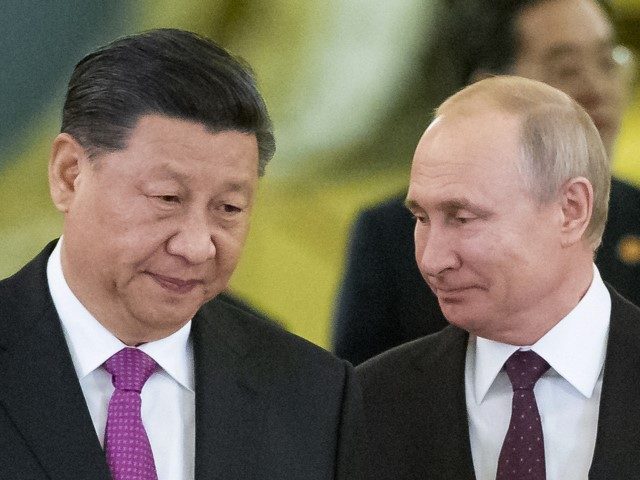Chinese communist dictator Xi Jinping joined a video call with the heads of state of France and Germany on Tuesday to berate them into opposing sanctions on Russia for its full-scale invasion of Ukraine, prioritizing the war thousands of miles away over the outbreak of Chinese coronavirus cases across 13 Chinese provinces this week.
China is a close ally of Russian leader Vladimir Putin and has claimed it would lend Moscow support in ensuring its alleged “security concerns” are met. Beijing has abstained from enthusiastically embracing the war in Ukraine, however, refusing to recognize the Ukrainian regions of Donetsk and Luhansk as independent countries and urging Russia to respect Ukraine’s sovereignty.
Chinese officials have also emphasized that they view Ukraine as a sovereign state unlike Taiwan, a democratic country China wrongfully considers a rogue “province.” In his speech announcing that he would recognize the alleged sovereignty of Donetsk and Luhansk, Putin declared Ukraine as “no tradition” of being a country and was “completely created by Russia.”
China’s state propaganda newspaper Global Times reported on Tuesday that Xi held a “virtual summit” with French President Emmanuel Macron and German Chancellor Olaf Scholz to urge them not to sanction Russia and pursue “peace talks” between Russia and Ukraine.
“Relevant sanctions will affect global finance, energy, transportation and stability of supply chains, and dampen the global economy which is already ravaged by the pandemic. This is in the interest of no one, Xi said during the virtual meeting,” according to the Times. “Xi stressed that the current situation in Ukraine is worrisome, and China is deeply grieved by the outbreak of war again on the European continent.”

An armed man stands by the remains of a Russian military vehicle in Bucha, close to the capital Kyiv, Ukraine, March 1, 2022. (AP Photo/Serhii Nuzhnenko, File)
Xi reportedly insisted the “sovereignty and territorial integrity of all countries must be respected” – an apparent rebuke of Putin’s stance on Ukraine, which recently signed major deals with Chinese companies – and that Europe should implement “a balanced, effective and sustainable European security framework.”
Macron’s office confirmed in a brief press release on the conversation that the three discussed “the role of sanctions” and added a detail missing from the Global Times‘ coverage: that the leaders discussed “an agreement with Iran” unrelated to the situation in Ukraine.
Xi’s remarks follow his top diplomat Wang Yi saying on Monday that China sought to take “after measures in order to settle this critical situation in Ukraine.” Wang did not elaborate on what role, exactly, the Communist Party was looking to play in the conflict, but emphasized the relations between Beijing and Moscow were “rock solid.”
Shortly after Wang’s remarks, the Global Times published a story bizarrely claiming that a Ukrainian neo-Nazi militia, the Azov Battalion, had been active in the 2019 anti-communist peaceful protests in Hong Kong. Should China choose to emphasize the allegation, it may give Beijing a superficial national security issue to become more heavily involved on Russia’s behalf in the war in Ukraine. Putin has called the war an effort to “de-Nazify” Ukraine, omitting that the country’s current president, Volodymyr Zelensky, is Jewish and lost family in the Holocaust.
Xi has taken a lower-profile public role in China’s policies in the past few months, surfacing only for issues involving international relations. Xi has been entirely absent in China’s domestic battle against the Chinese coronavirus, which originated in central Wuhan, China, in 2019. While much of the rest of the world has moved on from mandatory lockdowns, China continues what it calls its “zero-covid” policy with little success.

Workers in protective suits take a rest as people line up to register during a mass COVID-19 test outside a shopping mall in Beijing, Tuesday, Feb. 22, 2022. (AP Photo/Andy Wong)
Chinese health officials confirmed the re-emergence of the disease in 13 provinces nationwide on Monday, resulting in rolling lockdowns across major metropolitan centers. The provinces were all over the map, from southern Guangdong to northeastern Jilin, on the border with North Kora. Shanghai, the country’s largest metropolitan area, documented 45 cases on Monday, according to the Communist Party, which has faced years of accusations of underreporting coronavirus cases.
Beijing became the epicenter of the national struggle to contain the virus last month as the 2022 Beijing Winter Olympics began, prompting Communist Party officials to lock down multiple neighborhoods as a result. The Olympics itself were held inside a locked-down bubble under a system China called “closed-loop management.” The system failed, resulting in hundreds of cases being identified within the bubble. Officials forced athletes and others suspected of being exposed to coronavirus into widely condemned quarantine facilities featuring poor amenities and often with little explanation of what was happening to its victims.

COMMENTS
Please let us know if you're having issues with commenting.